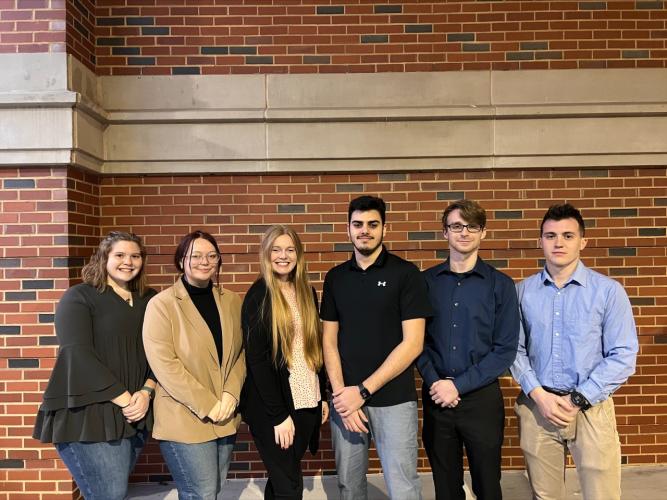

Through collaboration and innovative problem solving, a team of six chemical engineering students won first place in their task at the 32 nd WERC Environmental Design Contest in Las Cruces, N.M.
The team, composed of Rafik Baitamouni, Hagen Childers, Richard Danylo, Rachel Hampp, Mason Link and Emily McCarty, was tasked with creating a solution to remove volatile organic compounds, or VOCs, from contaminated water created in processes used by the oil and gas industry. VOCs are the gasses that are emitted into the air from these processes; they are often harmful to the environment and can even be carcinogenic.
“Currently, the oil and gas industries recycle the water used in their fracking process. This recycled water is kept in ‘open to air’ impoundments and could potentially emit the VOCs into the environment. Monitoring devices in New Mexico have recently shown VOC levels increasing at oil and gas sites and must be reduced,” Childers said.
“To follow environmental regulations, the water must be treated for VOCs first. This will keep the community safe while saving an abundance of water every year,” McCarty said. The competition consisted of a paper, oral presentation and bench-scale demonstrations of the contestants’ solution to a panel of judges comprised of industry professionals. In addition to the technical design, their solution must address health and safety, environmental, and public policy issues. The group must also provide an economic analysis of what it would take to implement their solution.
“The competition is an excellent experience for the team in dealing with difficult open-ended design problems. Many graduates point to it as one of the major highlights of their time at OHIO,” said Darin Ridgway, associate professor and chair of the Department of Chemical and Biomolecular Engineering .
The OHIO team approached the assigned problem by creating an adsorption process which utilized granular activated carbon, or GAC. The solution uses the GAC to adsorb the VOCs to its porous surface. The GAC can be regenerated, which makes this solution environmentally sustainable and cost effective.
“The team determined this to be the best solution through many beaker tests in our lab,” Childers said.
While this solution earned them first place in their task, their path to success was not always clear. In the early phases of preparing for the competition, the team struggled to communicate with one another. They quickly recognized that the problem they needed solve overlapped with the civil engineering discipline, so as a group of chemical engineering students they adapted to the interdisciplinary element of the challenge. As they progressed throughout the semester, they began to establish trust with one another and find balance among their varying skills and leadership styles.
“This experience has given me lifelong skills and friendships. The group started off with a lack of communication and trust issues, but as the year went on, we all learned how to communicate effectively as a group and became great friends,” Childers said.
The culmination of their work allowed them to present at the WERC Environmental Design Contest at New Mexico State University. When they presented their solution at the competition, the judging panel had concerns about their design. The group embraced the feedback and tried to adapt their design as needed.
“With engineering, it’s important to let those with in-field experience help guide you in the right direction. Sometimes being wrong is a good thing because you always learn from it,” McCarty said.
This competition gave the team members an opportunity to develop their technical skills in chemical engineering by collaboratively developing a solution to a real-world problem. In addition to getting hands-on practical experience, they were able to develop their soft skills in communication and leadership.
“One thing that has been difficult these past couple years navigating COVID was a lack of hands-on learning. As an engineering student, I thought that would be all I was doing, but my experience in college so far has been a bit altered. I think this opportunity really helped me reignite my passion for engineering and empowered me to have a bigger presence in the Russ College,” McCarty said.
The Russ College has a crowdfunding campaign to support students participating in competitions like WERC. Learn more and donate today .

